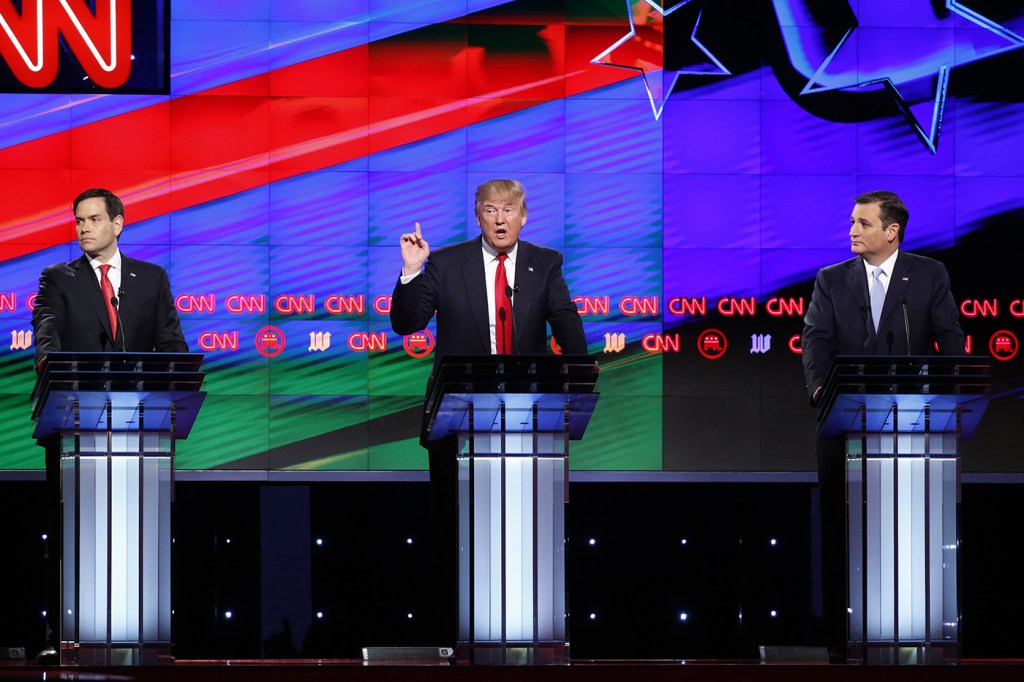Trump says he will skip the first Republican presidential debate. Will the frontrunner’s absence affect the GOP campaign?

Skipping the first Republican presidential debate may not hurt the clear frontrunner, former President Donald Trump, but the event could give his opponents a chance to cut into his lead in the polls, according to a debate expert from Northeastern.
The first debate presents a great opportunity for the other candidates to appeal to voters and raise campaign funds, according to Alan Schroeder, professor emeritus of journalism and expert in televised debates. He says the first debate draws a lot of attention.
The GOP debate takes place Wednesday in Milwaukee. Late Monday, the Republican National Committee confirmed eight candidates were expected to take the stage: North Dakota Gov. Doug Burgum, former New Jersey Gov. Chris Christie, Florida Gov. Ron DeSantis, former South Carolina Gov. Nikki Haley, former Arkansas Gov. Asa Hutchinson, entrepreneur Vivek Ramaswamy, Sen. Tim Scott of South Carolina and former Vice President Mike Pence.
“There will be about one debate a month for the next six months or so,” Schroeder says.
Does Trump’s absence matter?
Trump, who is leading the polls with considerable advantage over other candidates, announced that he will not be participating in the event.
Schroeder says it is not unusual for candidates to miss early debates.
“Candidates who are ahead in the polls can be a little more choosy about whether they participate more [and] at what point do they begin to participate,” Schroeder says.
Former President George W. Bush, for instance, skipped the first few debates in the 2000 race, Schroeder says, and he still went on to become the Republican nominee. Candidates look at whether attending a debate could be to their advantage or if they can get away without participating.
Live debates can be risky, Schroeder says, because it is hard to predict what is going to happen. Debates can hurt or help a candidate stand out in the crowd.
“If they have a good performance on Wednesday night, even some of these lesser-known, more obscure candidates could help themselves a lot,” Schroeder says. “A candidate who has a bad night or makes an error that gets played all over the internet and social media, could see their numbers actually harmed.”
How candidates can stand out
The first Republican debate will be moderated by Fox News Channel hosts Bret Baier and Martha MacCallum, experienced moderators, says Richard Katula, professor emeritus of communications studies at Northeastern, who specializes in classical rhetorical theory, argumentation and debate. Baier usually asks especially tough questions when he interviews politicians, Katula says.
There are so many candidates participating in the first debate, however, that journalism may take a back seat, Schroeder says. Moderators have to try to give everyone an opportunity to speak.
“It will be much easier next year,” Schroeder says.
Drawing media coverage sometimes becomes the most important goal for candidates, Schroeder says. Each of them should stick to their own personalities to make their case for voters, media and donors. A lot of the donors, Schroeder says, are still waiting to decide whom to support.
“All these people belong to the same party and they don’t have substantial differences in their views,” Schroeder says. “So they might crack a joke or speak about points they have not spoken about before.”
Topics that can differentiate a candidate might include climate change, gun violence, abortion or foreign policy. Or Trump.
“So, I think the one thing they’ll have to do is they’ll have to have an attack on Trump ready in their quiver,” Katula says.
Will candidates attack each other?
In collegiate debate, Katula says, you always try to be polite, courteous and choose a professional and lawyerly way to attack someone.
“But in those televised debates, I am afraid, lies and personal attacks are what stands out in my mind [in debates] from 2002 right to the last 2020 election,” he says.
Candidates attacking each is something that the television networks love, Schroeder says, because it’s dramatic, plays well in short video clips and generates memes people love as well.
“It generates conversation,” he says.
Candidates also feel they can gain something from getting into a verbal fight, Schroeder says, but it harms the purpose of the debate of informing people.
In the 2016 elections, when there were more than a dozen candidates vying for the Republican nomination, Trump kicked all of them one by one, Katula says.
“He went right after Jeb Bush,” he says. “That’s the kind of thing that sticks in people’s minds.”
Katula believes that the first out of two presidential debates between Trump and President Joe Biden moderated by Chris Wallace turned the fate of the 2020 election.
“Trump came across as a bully and was talking over Biden, talking over Wallace,” he says. “That was a terrible, terrible mistake on Trump’s part.”
When and where to watch the debate?
The broadcast of the two-hour debate will start at 9 p.m. EDT exclusively on Fox News Channel and the Fox Business Network. Viewers can also access the live stream on Fox’s website and other streaming and digital platforms.
The RNC chose to partner up with the video platform Rumble instead of the Fox network’s YouTube channel to live stream the debate, according to the Associated Press.
The GOP might have chosen Wisconsin for the first debate, Schroeder says, because it has been a swing state in the past and the party wants to determine which candidates have the potential of winning the state. Sometimes, the debate is held where a sponsor is located.
Republicans will also hold their national convention in Wisconsin in July 2024.
What GOP candidates needed to qualify for the debate
The media used to control and put on debates, Schroeder says, but in recent years the parties took control of the process. The parties set their own admission rules and choose what networks to partner up with.
This year the RNC required candidates to draw at least 40,000 individual donors and register at least 1% support in three national polls or in two national and two early state polls that met the RNC’s criteria to qualify for the first debate.
“I am really upset with the Republican National Committee for setting the standard so low,” Katula says. “You have people with 1%, 2% in the polls who are running for president and they’re going to eat up television time.”
Another issue is how candidates collect donations to qualify. Burgum, for example, a wealthy businessman, has promised $20 gift cards for each person who donated $1, to get enough donors.
“You can argue that he bought his way onto the stage,” Schroeder says, “but technically he’s within the rules.”
By meeting the requirements candidates show that they are serious and have an actual chance of becoming a nominee, Schroeder says.
This year, just like in the 2016 elections, the candidates were asked to sign a pledge that they would support the eventual nominee.
“It is kind of a joke,” Schroeder says. “It makes the party feel like all of these would-be contenders for the nomination will eventually get behind whoever the nominee is.”
But signing the pledge does not mean that the candidates are going to abide by it. Trump, for example, completely refused to sign the loyalty pledge, saying that he wouldn’t support some of the candidates were they to become the nominee.
“I think the winner of the presidency will be a person with the ground game, a person who’s organized, who’s got his staff working, who knows what states are key, keeps the candidate focused on those states and wins those states,” Katula says. “That’s who will get [to run] for president and God bless us if it’s Trump versus Biden.”
Alena Kuzub is a Northeastern Global News reporter. Email her at a.kuzub@northeastern.edu. Follow her on Twitter @AlenaKuzub.






